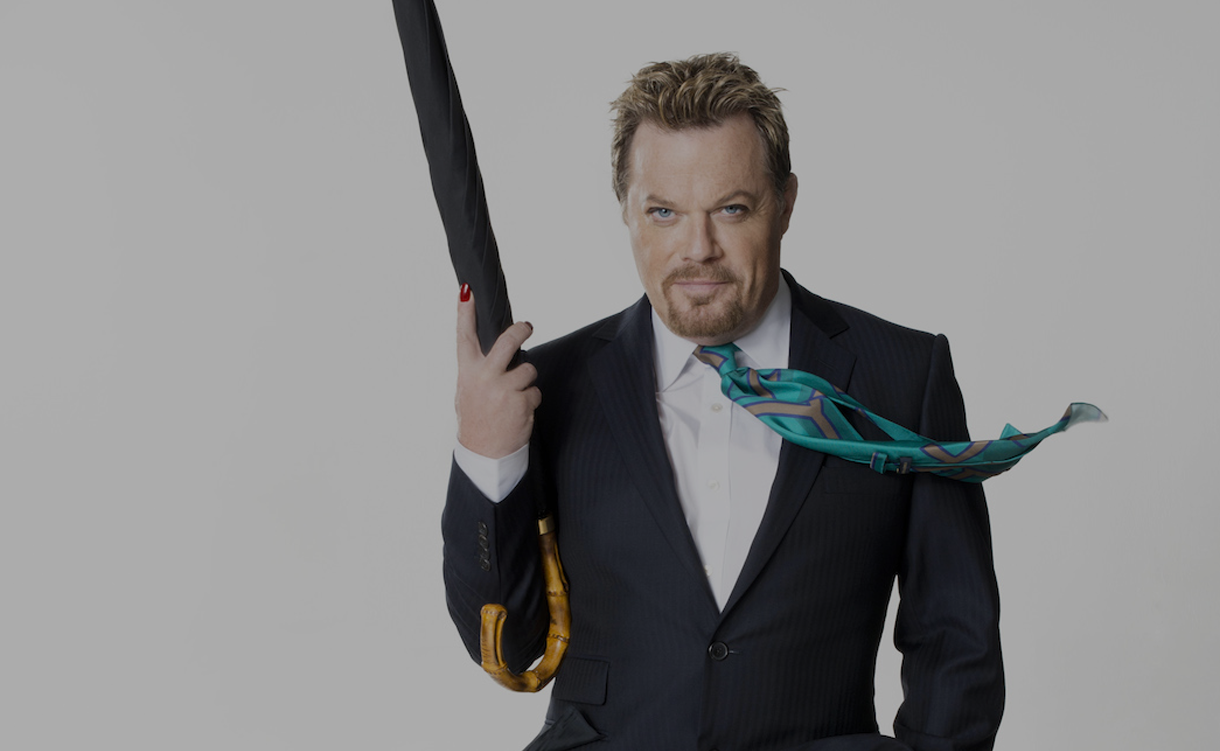On the Red Couch with Comedian Eddie Izzard
Shona Sanzgiri / July 30, 2015

“A sense of humor is just common sense, dancing,” said the American philosopher William James. Getting a laugh poses risks: say the wrong thing and everyone thinks you’re tone deaf. Ironically, it’s a serious matter.
For comedian and actor Eddie Izzard, it’s also a career hazard. Fond of making things hard for himself, the potential mayoral candidate and near-manic marathoner has given himself a new challenge: to be funny in five languages (six including English). This year, Izzard brings his Force Majeure tour—one of the longest standup shows in history—to 27 countries, performing in German, French, Spanish, Russian and Arabic.
If learning new languages helps Izzard connect with different cultures, his “fascination for history” goes a step further—flip through his Flipboard magazine for proof. Currently touring Australia, Izzard took a break to tell us whether his jokes get lost in translation, if comedy can be taught and what he does in his downtime…
You do things that would exhaust most people. What do you enjoy about such challenges?
It’s basically all about going ‘off piste.’ When snowboarders or skiers go ‘off piste,’ what they experience can be magnificent, with a wonderful feeling of speeding through untouched snow, with magnificent views before you but with a distinct threat of danger all around you.
All I’m doing is basically going ‘off piste’ in different areas of human endeavor, experiencing the feeling of moving through uncharted territories (of running through the United Kingdom or making people laugh in one’s second or third language) but with a threat of physical collapse or public humiliation.
But I don’t feel the things that I do really are dangerous, just mentally challenging.
Telling jokes in different languages presents a range of challenges. Are there any surprising nuances or differences to telling a joke in French or German vs. English?
There are no nuances of difference to telling a joke in different languages. How it works is like this: Humor is human—it’s only the references that are national. I believe that there are no national senses of humor. No ‘British sense of humor’, no ‘American sense of humor,’ etc.
But there are, in fact, two general senses of humor in every country: a mainstream sense of humor and a more alternative sense. Therefore, it’s only the references that will screw you up as you move from one language to another.
I have designed my comedy, for the last 20 years, to be ‘universal’ humor, talking about subjects and using references that every alternative/progressive audience in the world will know of.
I open my Force Majeure tour by talking about human sacrifice. My point is, why did priests of some religions ever suggest, “The weather is bad, the crops have failed, the gods must hate us—so we’re going to kill Steve.” I have delivered this line in English and got a positive response (i.e. a laugh) from audiences in Britain, America, Russia, Turkey, South Africa, Sweden, Netherlands, Serbia, Croatia, France (in French) and Germany (in German). They all ‘get’ it.
Given how much you work, how do you manage your time? What do you do in your downtime?
When your work is very engaging, you don’t seem to need downtime. In the spring of 2011, I performed six shows a week for three months, in Paris, in French.
It was bloody hard work at the beginning, but it gradually became easier and easier, and I remember it now as the most amazing ‘holiday’ anyone could ever have. You couldn’t buy that experience.
Woody Allen’s Midnight in Paris came out around the same time and I do like this rather magical film, but I actually lived my own magical film—living on the seventh floor of a building at the top of Montmartre, overlooking the whole of Paris. It was absolutely wonderful—as was my two months in 2014 in Berlin, doing six shows a week, all in German.
What are the last books you’ve read?
The latest books I have downloaded are: In the Hour of Victory by Sam Willis, Steve Jobs by Walter Isaacson, Wolf Hall by Hilary Mantel, The Past is Myself by Christabel Bielenberg, The Double Helix by James Watson, Good Morning, Mr Mandela by Zelda la Grange and Waterloo by Bernard Cornwell.
You’ve worked hard to get where you are, but being funny is sort of a natural trait. Do you think humor can be taught?
I’m afraid I think that a sense of humor is genetically inherited. My father, my brother and I all have roughly the same sense of humor. Sometimes, when we are together, we sound like a triple act.
I do think you can direct people to deliver funny lines in a funnier way but people with ‘funny bones’ can make funny out of something that is not funny on the page.
And who are some of your favorite comedians today?
Patton Oswalt, Steve Coogan, Harry Enfield.
Your love of history is well known. What is it about it that fascinates you?
The past is just the present lived in funny clothes and with a more constant threat of death.
If you study it, you can estimate the future.
~ShonaS is curating “Proof of Experience”
GET FLIPBOARD ON:
iOS / ANDROID / WINDOWS / WEB
FOLLOW US ON:
FLIPBOARD / TWITTER / INSTAGRAM / FACEBOOK / GOOGLE+ / TUMBLR / YOUTUBE / SOUNDCLOUD / PINTEREST / MEDIUM





